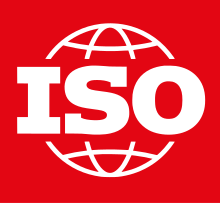
Back ISO AF المنظمة الدولية للمعايير Arabic منظمة ايزو ARZ আন্তৰ্জাতিক মান সংস্থা AS Organización Internacional de Normalización AST Халкъаздагьоркьосеб роценалъул гӀуцӀцӀи AV Beynəlxalq standartlaşdırma təşkilatı AZ Халыҡ-ара стандартлаштырыу ойошмаһы BA ISO BE Міжнародная арганізацыя стандартызацыі BE-X-OLD
Organisation internationale de normalisation | |
 | |
| Abbreviation | ISO |
|---|---|
| Predecessor | International Federation of the National Standardizing Associations (ISA) |
| Formation | 23 February 1947 |
| Type | Non-governmental organization |
| Purpose | International standards development |
| Headquarters | Geneva, Switzerland |
| Membership | 170 members (39 correspondents and 4 subscribers)[1] |
Official languages |
|
President | Sung Hwan Cho |
| Website | www |
| Internet history timeline |
|
Early research and development:
Merging the networks and creating the Internet:
Commercialization, privatization, broader access leads to the modern Internet:
Examples of Internet services:
|
The International Organization for Standardization (ISO /ˈaɪsoʊ/[3]) is an independent, non-governmental, international standard development organization composed of representatives from the national standards organizations of member countries.[4] Membership requirements are given in Article 3 of the ISO Statutes.[5]
ISO was founded on 23 February 1947, and (as of July 2024[update]) it has published over 25,000 international standards covering almost all aspects of technology and manufacturing. It has over 800 technical committees (TCs) and subcommittees (SCs) to take care of standards development.[6]
The organization develops and publishes international standards in technical and nontechnical fields, including everything from manufactured products and technology to food safety, transport, IT, agriculture, and healthcare.[6][7][8][9] More specialized topics like electrical and electronic engineering are instead handled by the International Electrotechnical Commission.[10] It is headquartered in Geneva, Switzerland.[6] The three official languages of ISO are English, French, and Russian.[2]
- ^ "ISO members". International Organization for Standardization. Archived from the original on 24 January 2021. Retrieved 17 November 2020.
- ^ a b "How to use the ISO Catalogue". International Organization for Standardization. Archived from the original on 4 October 2007.
- ^ Dare to dream BIG: Standards empower innovators (EN, ES, FR). ISO. 24 October 2016. Archived from the original on 14 February 2022. Retrieved 14 February 2022.
- ^ "ISO Membership Manual". ISO. Archived from the original on 10 April 2022. Retrieved 10 April 2022.
- ^ ISO Statutes (PDF) (in English, French, and Russian) (20th ed.). Geneva: International Organization for Standardization. 2022. ISBN 978-92-67-02040-2. Archived (PDF) from the original on 31 March 2022. Retrieved 12 April 2022.
- ^ a b c "About ISO". ISO. Archived from the original on 17 February 2023.
- ^ "New 'net zero' standards could transform the climate – unless they're derailed". The Washington Post. Archived from the original on 2 February 2022. Retrieved 18 March 2022.
- ^ "Health sector standards". ISO. 6 April 2023. Retrieved 28 January 2024.
- ^ "Transport sector standards". ISO. 20 January 2023. Retrieved 28 January 2024.
- ^ Editors of Encyclopedia Britannica. 3 June 2021. "International Organization for Standardization". Archived 12 April 2022 at the Wayback Machine. Encyclopedia Britannica. Retrieved 2022-04-26.